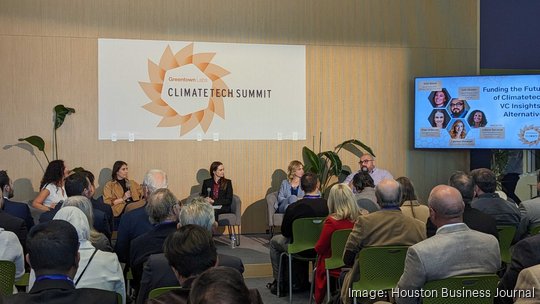
Houston is more innovative than outsiders think, according to 75% of respondents in the new "Houston’s Climate Tech Ecosystem" report released by the Texas Climate Tech Collective this week.
TCTC co-founders Deanna Zhang, Taylor Chapman, and Gabriel Malek discussed the findings of the report at a Nov. 1 panel during Greentown Labs’ annual Climate Technology Summit. The report includes data from over 200 founders, investors and other ecosystem players, as well as 20 interviews with innovation leaders.
“The No. 1 theme was that Houston has a little bit of a reputation problem,” said Zhang, a Forbes 30 Under 30 honoree who also serves on the advisory board of Denver-based Boundless Capital Partners. “People in this community like to talk about energy because we’re the energy capital of the world. We don’t use the word climate enough, and it might not be a big deal — but other ecosystems are using that word.”
Respondents in the TCTC report identified Houston’s “anti-climate reputation” as the No. 1 disadvantage of the city’s climate technology ecosystem. The Bayou City’s tendency to be overlooked by outsiders was ranked No. 3 behind lack of access to venture capital. Meanwhile, 21% of respondents said Houston should campaign to promote its energy transition initiatives and accomplishments to reverse the anti-climate perception.
Specific recommendations from the survey suggested energy transition companies should open offices in Houston, and several companies from multiple green technology sectors have already gotten moving this year.
Ohmium, a California-based green hydrogen company that landed one of the city’s biggest funding rounds earlier this year, said it would use capital from its $250 million Series C round to open a Houston office. Other companies that have moved within the Bayou City include U.K.-based Drax Group and Houston-based decarbonization technology company Utility Global.
How climate companies are funded
Another panel at the Greentown event discussed future funding for climate technology, especially in an environment where the amount of venture capital deals is decreasing. The panel was moderated by Juliana Garaizar, Greentown’s head of development, and featured Luis Alcocer, general manager of Chevron’s Future Energy Fund; Julie Greco, senior associate at Chicago-based Energy Capital Venture; Hertha Metals CEO Laureen Meroueh; and Ellen Wilkirson, managing director of Houston-based Freestone.
Alcoser discussed new investment programs that California-based Chevron Corp. (NYSE: CVX) launched within its venture fund to help the energy giant stay up to date on new innovations. He listed the fund’s catalyst program, launched in 2017, as a significant source of milestone-based funding for pre-seed or seed-based companies.
“We’ve been investing for about 25 years, but I think what’s kept us successful is to evolve, and part of that evolution is creating new evolution tools or instruments,” Alcoser said. “We’re able to nurture innovation and get much earlier in the pipeline to see innovation.”
The TCTC report found that 72% of surveyed startups were not confident in their ability to raise capital while remaining in Houston, and 53% of respondents cited access to venture capital as a challenge facing the ecosystem. The report recommended attracting more VCs to open offices in Houston and making it easier for Houston’s established institutional funds and leaders to enter the VC space.
One institutional energy investor who turned to climate technology is Bobby Tudor, who was consulted for the TCTC report. Tudor, who retired from Houston-based investment bank Tudor, Pickering and Holt Co. in 2022, founded his own firm, Artemis Energy Partners, later that year. In 2023, Houston-based Artemis has invested in several energy transition startups, including San Francisco-based Puloli and Austin-based P6 Technologies.
Maynard Holt, one of Tudor’s former partners, also launched his own firm, Veriten. In October, Houston-based Veriten closed its debut fund, NexTen LP, with $85 million in capital commitments.





